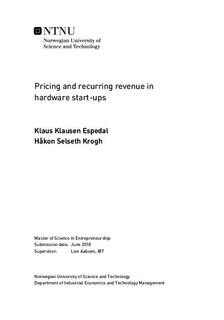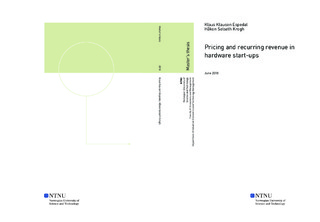| dc.description.abstract | The purpose of this study is to provide time-relevant knowledge to the business development process for future hardware start-ups. This study investigates how hardware start-ups reason their choices when developing their business models, with focus on the revenue model and pricing strategy. The most important underlying factors for their choices and how these choices relate to the product development will be described.
Hardware companies usually sell their products one time to the same customer. Different mechanisms for ensuring recurring revenue exists, but they are often related to software or service. In the literature review, it was found that the underlying rationales and reasoning behind a hardware start-up s choice of price and revenue stream is little discussed. This thesis will contribute to the literature gap by investigating how hardware start-ups develop their business model through collecting empirical data and analyzing it with basis in the literature.
The empirical research was carried out as a qualitative case study, studying three Norwegian business to consumer hardware start-ups and three business to business hardware start-ups. The analysis show that the start-ups have developed their business models though identifying and utilizing their customers as partners for testing the business models. The cases used value-based pricing models, meaning they are creating products only with specifications that are attractive to the users. This enables them to put high prices on their products, as the price is not part of the value proposition.
The results of this thesis implicate that making high-cost products to differentiate themselves is a preferred strategy amongst the cases in the study. Also, it was found that start-ups, already having forms of recurring revenue in their business model, did not consider their business model as recurring. From the cases in this study, it seems as starting off a new company with an innovative attitude towards the business model and that this is important for the success, makes it more likely that the model is developed and changed in the future as well. However, all the cases were focused on finding the customer fast and configure the model to their preferences. This attitude will ensure less time spent on business development and reduce the need for innovation in the business model. The user contact is central to the development for both business model and product.
The authors recommend that future research on this subject should follow up the cases over time, to evaluate their long-term sustainability up against the results in this thesis. | |

